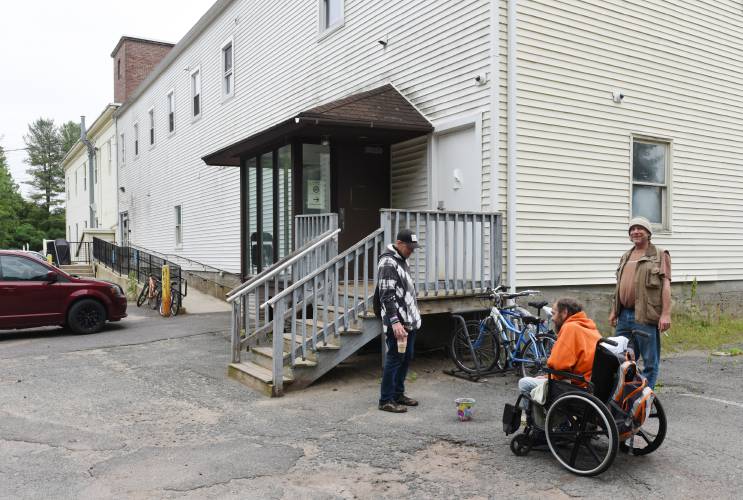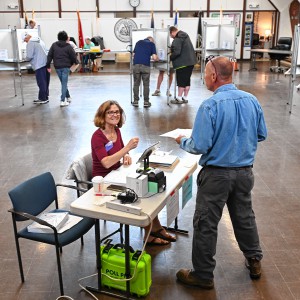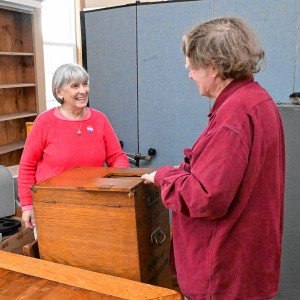Greenfield shelter complaints aired at Human Rights Commission meeting

Guests socialize outside the homeless shelter on Wells Street in Greenfield, which is now run by Clinical & Support Options, in June 2022. It was formerly operated by ServiceNet. STAFF FILE PHOTO/PAUL FRANZ
| Published: 12-12-2023 7:21 PM |
GREENFIELD — A handful of guests, both past and present, of the homeless shelter on Wells Street appeared before the Human Rights Commission on Monday night to offer their support for complaints filed by two brothers against Clinical & Support Options (CSO), which manages the shelter.
The brothers, Chris and Brian Heath, alleged bullying and discrimination by CSO staff, the use of drugs and alcohol by guests in the facility, and a failure to connect guests with necessary services, housing and otherwise. Chris Heath, who is the caretaker for his brother Brian, said he was removed from the shelter over a month ago for not getting rid of the television he had in his bedroom, which was against shelter policy. Both were staying at the shelter at one time, but now Brian is the only one there.
“I feel like me and my brother were discriminated against personally ... by this organization that’s supposed to be here for the community,” said Chris Heath. “We’ve received no help whatsoever.”
Hesitant to comment on specific cases in particular, CSO’s Director of Shelter & Housing Keleigh BenEzra told commissioners the goal of the shelter is never to put people on the street and that nobody would be kicked out over a TV. She did note, however, that there are guidelines in place to ensure an “environment of safety and care.” That includes limiting food consumption in sleeping areas to prevent pests from coming indoors.
BenEzra added that Chris Heath is eligible to “get on triage,” or begin the process to access the shelter. He responded, however, by saying he didn’t plan to return.
After more than an hour of discussion, BenEzra agreed to meet with Human Rights Commission Chair Mpress Bennu for a walk-through of the shelter on Wells Street. Commissioners Lance Smith and Kathleen Kenny, meanwhile, will be part of a subcommittee to discuss potential programming and ways that the Human Rights Commission can help the shelter.
Bennu also recommended that BenEzra speak with staff at the shelter.
“It seems like trust is lost between [guests] and the staff,” she said. “Something must be going on if they’re filing grievances and come this far to file it with us. ”
Article continues after...
Yesterday's Most Read Articles
 Serious barn fire averted due to quick response in Shelburne
Serious barn fire averted due to quick response in Shelburne
 Bridge of Flowers in Shelburne Falls to open on plant sale day, May 11
Bridge of Flowers in Shelburne Falls to open on plant sale day, May 11
 Political newcomer defeats Shores Ness for Deerfield Selectboard seat
Political newcomer defeats Shores Ness for Deerfield Selectboard seat
 Roundup: Pioneer baseball wins Suburban League West title following 2-0 win over Hopkins
Roundup: Pioneer baseball wins Suburban League West title following 2-0 win over Hopkins
 As I See It: Between Israel and Palestine: Which side should we be on, and why?
As I See It: Between Israel and Palestine: Which side should we be on, and why?
 Employee pay, real estate top Erving Town Meeting warrant
Employee pay, real estate top Erving Town Meeting warrant
She added that it was “troubling” to hear concerns about retaliation for those who spoke out. BenEzra echoed that concern.
“Nobody should feel like if something is being done to me, I shouldn’t be able to speak up for myself,” Bennu said.
In April, CSO took over operations at the Greenfield shelter, which was previously overseen by ServiceNet. The nonprofit was tapped in November 2022 by the state Department of Housing and Community Development to provide emergency shelter services to homeless adults. Administrators are planning for a dramatic $23 million transformation of the existing emergency shelter at 60 Wells St. The proposed design includes a renovation of the existing building, expanding shelter capacity from 30 to 40, and construction of a new three-story building that will hold 36 studio apartments.
The transition between managing agencies, however, “has been hard,” in the words of resident Ryan Whitney, who described himself to the Human Rights Commission as an advocate and friend of the homeless.
“I’ve spent days with [Chris and Brian]. It’s hard for me to even articulate the human rights violations that have happened to these people,” Whitney said. “I don’t know if it’s because of the transition or if CSO is trying, or understaffed, but they’re not doing the job they say they’re doing on their mission statement.”
One particular concern highlighted by those who spoke in the City Hall meeting room on Monday was the use of drugs and alcohol within the shelter, particularly in an environment where many are recovering from substance use disorders. Jane Banks, CSO’s vice president of housing and homeless services, said this was a reflection of CSO’s “Low Threshold Housing and Services” model, which is funded by the Massachusetts Department of Public Health.
This means people are coming into the shelter “with varying degrees of challenges,” according to Banks.
“We take people in as they are, and that can be challenging for people who are there,” she said.
Heath and Whitney argued, however, that the support for people dealing with addiction was not there. Others commented on their experience finding hypodermic needles throughout the shelter.
“Harm reduction is not working in our community,” Whitney said. “I’ve been a victim of the system, and I got out.”
Whitney said while it’s helpful to hear about the services CSO has to offer, “on the ground level, it’s not in place,” noting two case managers for 45 people is not enough to get people the services they need.
BenEzra acknowledged the challenge posed by those numbers.
“It’s not perfect,” she said. “It’s a work in progress.”
The Human Rights Commission plans to meet next month to go over the findings of its shelter investigation.
Reporter Mary Byrne can be reached at mbyrne@recorder.com or 413-930-4429. Twitter (X): @MaryEByrne.

 No surprises in Wendell election
No surprises in Wendell election New Salem election ushers in new Selectboard member
New Salem election ushers in new Selectboard member
